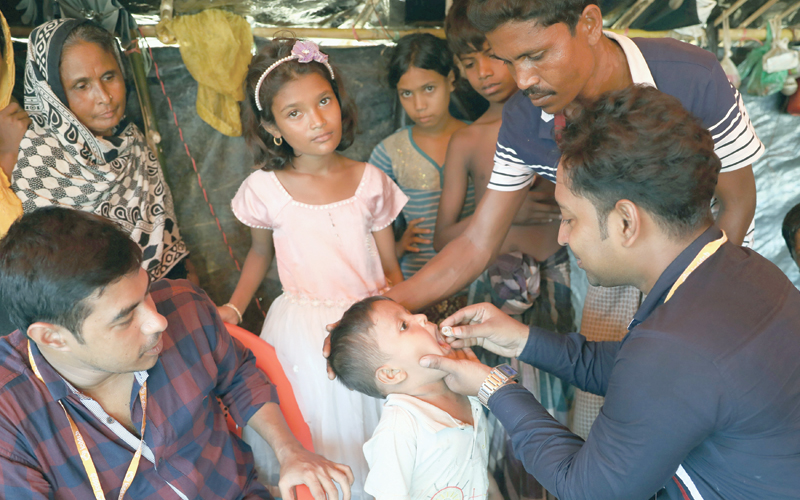

FIGHTING OUTBREAK: The UN is working with Bangladesh to vaccinate 650,000 people living in sprawling camps against cholera -
Thangkhali, Bangladesh: The United Nations launched one of its biggest ever cholera vaccination drives in the vast refugee camps of southeast Bangladesh on Tuesday amid fears of an outbreak among nearly a million Rohingya now living there.
Thousands of Rohingya men and women lined up in intense heat at makeshift health centres, many with young children in their arms, to receive the oral vaccine against the disease.
The UN is working with the Bangladesh government to vaccinate 650,000 people living in the sprawling camps against cholera, which spreads through dirty water and can kill if left untreated.
“These people lack most of the basic services — toilets, water sanitation and everything,” Unicef spokesman A M Sakil Faizullah said. “When we have this kind of situation, there’s a heavy possibility of a cholera outbreak.”
Nearly 520,000 Rohingya Muslims have arrived in Bangladesh since late August, fleeing a military crackdown in neighbouring Myanmar that the UN has said likely amounts to ethnic cleansing.
Bangladesh has struggled to cope with the mass influx of people, many of whom have to travel for days or even weeks to reach safety and arrive exhausted and malnourished.
The influx had slowed in recent weeks, but now appears to have picked up again and an estimated 11,000 new refugees arrived on Monday.
The UN refugee agency said on Tuesday it was working with the Bangladesh authorities to set up a transit centre in preparation for a fresh influx from Myanmar’s Rakhine state.
Many of the new arrivals are from the Buthidaung district of Rakhine which lies relatively far from the border. They said the army in Myanmar had prevented them from buying food, making it impossible for them to stay.
An AFP photographer at the scene on Monday saw one distraught man arrive carrying the limp body of his infant son who had died as they crossed the Naf River that divides the two countries.
Dozens more are feared to have drowned when a boat packed with desperate refugees sank late on Sunday night. Bangladesh police said on Tuesday they had found 14 more bodies, taking the number of confirmed dead to 28, with scores more missing.
Across the border in Myanmar, hundreds of Rohingya were massed on the riverbank awaiting the opportunity to leave. “We want to go to Bangladesh. It’s over for us here. We have to cross quickly but we don’t have the money to pay for the boat,” one Rohingya father of four told an AFP reporter in Rakhine state.
The family had walked for several days from Buthidaung to reach the riverbank, where hundreds more Rohingya were waiting to escape. The majority were children.
World Health Organization (WHO) workers and local volunteers will vaccinate 650,000 Rohingya over the coming weeks and then follow up with a second dose of the vaccine for an estimated 250,000 children aged between one and five.
It the second biggest such campaign ever, after 800,000 people were immunised against the disease in Haiti in November. The WHO’s Bangladesh representative N Paranietharan called it a “huge undertaking” and said he was confident an outbreak would be averted. — AFP
Oman Observer is now on the WhatsApp channel. Click here



